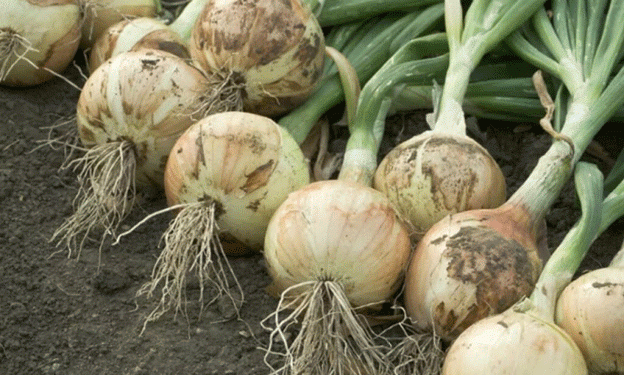In Uganda, onions are more than just a kitchen staple—they are an agricultural commodity with rising significance. Both production and consumption have shown steady growth over the past years, making onions a vital crop for food security and income generation. This article delves into Uganda’s expanding onion industry, its health benefits, and the obstacles farmers must overcome to sustain this momentum.
Production and Demand: A Steady Climb
Recent data highlights a promising trajectory for Uganda’s onion industry:
- Consumption Growth: Onion demand is projected to grow from 350,000 metric tons in 2021 to 372,000 metric tons by 2026, at an annual growth rate of 1%.
- Production Growth: Domestic production is expected to rise from 368,000 metric tons in 2021 to 386,300 metric tons by 2026, reflecting an annual increase of 0.8%.
While Uganda ranks 36th globally in both production and consumption, it has made strides in reducing dependency on imports by increasing domestic cultivation. Small- to medium-scale farmers are the backbone of the onion supply, leveraging Uganda’s tropical climate to cultivate multiple harvests annually.
The Culinary and Health Appeal of Onions
Onions are indispensable in Ugandan cuisine, prized for their versatility and health benefits.
- Culinary Usage: Onions are consumed in fresh, cooked, and raw forms, featuring prominently in soups, stews, salads, and even juices. Their affordability ensures accessibility across all income levels.
- Nutritional Value: Onions are a powerhouse of essential nutrients, including:
- Vitamin C and B6: Boost immunity and improve metabolism.
- Antioxidants like quercetin: Support heart health and reduce inflammation.
- Fiber: Promotes digestive health.
- Health Benefits: Regular onion consumption has been linked to:
- Lower risk of chronic diseases like cardiovascular issues and certain cancers.
- Improved blood pressure and cholesterol levels.
- Enhanced antibacterial properties, aiding digestion and immunity.
These benefits are increasingly recognized in Uganda, prompting greater inclusion of onions in diets, even in non-traditional forms like raw salads and juices.
Challenges Facing Onion Farmers
Despite the encouraging growth, onion farmers in Uganda face several challenges:
- Access to Quality Seeds: Many farmers struggle to obtain high-yield, disease-resistant varieties.
- Irrigation Infrastructure: A reliance on rain-fed agriculture makes farmers vulnerable to climate variability.
- Market Price Fluctuations: Farmers face unstable prices due to supply-demand imbalances.
- Limited Training and Inputs: Smallholders often lack access to modern farming techniques and tools.
Government and Industry Support
Recognizing the sector’s potential, the Ugandan government and agricultural organizations have initiated programs to support onion farming:
- Training Programs: Farmers receive guidance on sustainable practices and modern agricultural techniques.
- Access to Inputs: Support includes distribution of quality seeds, fertilizers, and irrigation equipment.
- Market Access: Efforts are underway to connect farmers with stable markets to reduce price volatility.
Onion production and consumption in Uganda represent a success story in the making. The crop’s dual role in enhancing food security and promoting public health underscores its growing importance. While challenges persist, coordinated efforts between the government, agricultural organizations, and farmers can unlock the full potential of Uganda’s onion industry. With rising demand, improved infrastructure, and a focus on sustainable practices, onions could become a cornerstone of Uganda’s agricultural economy.































